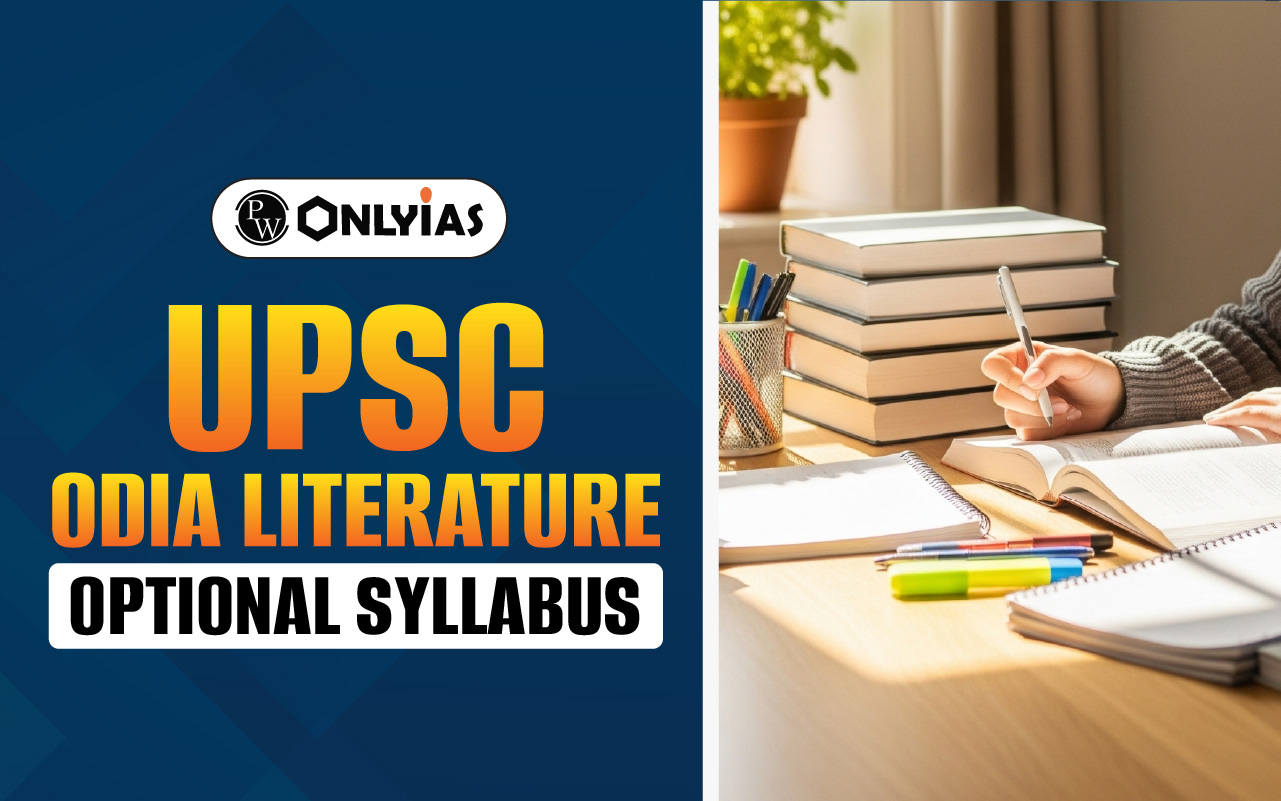UPSC Odia Literature Optional Syllabus 2026 PDF covers the complete syllabus for candidates choosing Odia Literature in the UPSC Civil Services Mains Exam. It includes grammar, history, and evolution of Odia language, key literary works, and critical analysis across two papers (Paper I & II). Download the official syllabus PDF to plan your preparation effectively.

Odia literature optional syllabus is a widely queried topic by aspirants planning to take up the subject as an optional in UPSC CSE Mains. Odia literature is suitable for candidates belonging to Odisha or having very good exposure to Odia. If you plan to take up Odia literature, this article is exactly what you need to kick-start your preparation.
Odia is a language spoken in the eastern Indian state of Odisha. Belonging to the Indo-Aryan language, the Odia language is also spoken across some pockets of Andhra Pradesh, Chhattisgarh, West Bengal, and also Jharkhand. Odia is one of the 22 official languages of India mentioned in the 8th schedule of the constitution. Recently, Odia has also been designated as a classical language, along with Tamil, Sanskrit, Kannada, Telugu, and Malayalam.
The whole syllabus of optional Odia literature will cover the basics of the Odia language and its important literary works. The syllabus is divided into two papers: Paper I and Paper II, each worth 250 marks. Both papers consist of eight questions divided equally into two sections, each having four questions. The candidates are required to attempt any five questions, with Questions 1 and 5 being compulsory. Out of the remaining six, candidates have to attempt any three, selecting at least one from each section.
UPSC Odia Literature Optional Exam Pattern |
|
| Particular | Details |
| Total Papers | Two papers, Paper I and Paper II |
| Total Marks | 500 (250 Each) |
| Time allowed | 3 Hours for each paper |
| Sections | Section A and Section B |
| Questions | total 8 questions with subparts |
| Compulsory Question | Question Nos. 1 and 5 |
| Marks Distribution | 10, 15, and 20 marker questions |
Candidates opting for Odia literature have to answer the question in Odia using the Odia script.
The Odia literature optional syllabus covers aspects of Odia, such as the grammar of the language, its history and evolution, the impact of other languages on it, the linguistic variation in different regions, and selected literary works. The following table contains a detailed Odia literature syllabus:
| Section A: History of the Odia Language | |
|
|
| Section B: History of Odia Literature | |
|
Paper II of the syllabus will cover Odia poetry from ancient, medieval, and modern times, along with drama, novels, short stories, and essays from Odia literature.
| Section A: Poetry | |
|
|
| Section B: Drama, Novel, Short Story and Essay | |
|
UPSC Odia Literature Syllabus PDF
The UPSC Odia Literature Optional Syllabus 2026 PDF provides the complete syllabus for candidates choosing Odia Literature as an optional subject in the UPSC Civil Services Mains Exam. It covers the history, grammar, and development of the Odia language, key literary works from ancient to modern periods, and critical analysis of texts across two papers (Paper I & Paper II), each worth 250 marks. Aspirants can download the official syllabus PDF to plan and organise their preparation effectively.
Candidates have to identify the books that cover the Odia literature syllabus completely, both Paper 1 and Paper 2. The following is a list of books that are vital for Odia literature optional:
| Paper 1 | Paper 2 |
|
Read all the original texts of the literary works mentioned in the syllabus. |
Before you start preparing the Odia literature optional syllabus, you need to keep in mind certain things that will help you gain an added advantage. The following strategy can be followed for higher chances of success:
Looking at the Odia literature optional syllabus, it is clear that candidates will have to possess significant knowledge about the language and literary aspects. Only by developing these characteristics, they score good marks in the subject. But this does not mean that only candidates with a literature background can succeed by taking the subject. Students from literary backgrounds will have an added advantage over their competitors.
Check Out UPSC CSE Books
Visit PW Store
| Must Read | |
| NCERT Notes For UPSC | UPSC Daily Current Affairs |
| UPSC Blogs | UPSC Daily Editorials |
| Daily Current Affairs Quiz | Daily Main Answer Writing |
| UPSC Mains Previous Year Papers | UPSC Test Series |
Yes. The candidate has to compare the syllabus of both exams and identify the overlapping syllabus. Those parts that overlap can be prepared from the same source.
Test series help a candidate develop the mindset that is required for the exam. It will also help them identify their weaknesses and work on them before the actual exam.
The ratio of successful candidates opting for Odia optional in the last few years is zero. The number of candidates opting for Odia literature is also in single digits.
Yes. Reading the original literary text is compulsory. Reading the original work will help candidates to understand the text in a better way.
Yes. Toppers’ answer copy will provide hints about the way rewarding answers are written. After reading, candidates have to develop a proper strategy to score well in the exam.

<div class="new-fform">
</div>